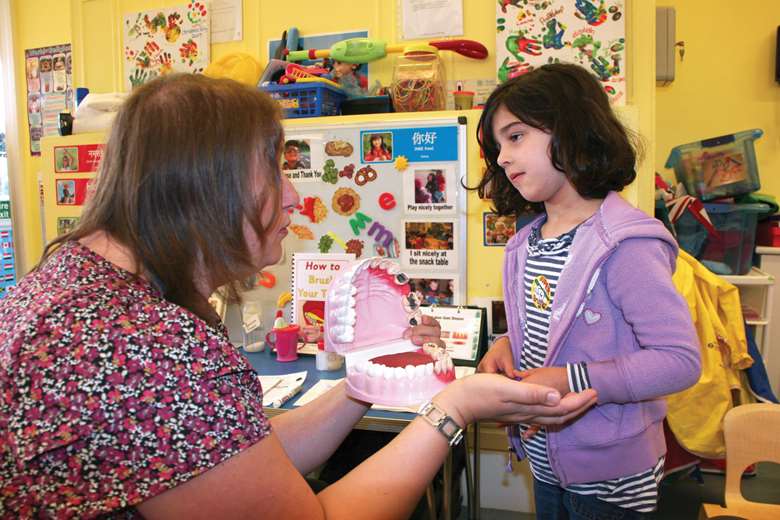Skills for the Job: How to promote oral health
Professor Elizabeth Kay
Tuesday, November 11, 2014
Tooth brushing schemes in schools and nurseries, and fluoride varnishing for all children could help to prevent tooth decay.

What are the causes of poor oral health?
Unfortunately, poor oral health disproportionately affects the most vulnerable people in society, including children. Many children have poor diets and poor mouth hygiene because they eat too much sugar and do not clean their teeth with fluoride toothpaste.
As a society, we should help parents and carers give their children the best start in life, and act now to stop the rot before it starts. Some people believe that the health of a child's first teeth does not matter as "they will fall out anyway". However, severe tooth decay at a young age can have negative consequences in later life.
The National Institute for Health and Care Excellence has provided advice to local authorities to improve their whole community's health through better advice and support in oral hygiene by encouraging people to visit the dentist regularly, and through eating and drinking more healthily.
What are the implications of it?
Having poor oral health can have a lifelong effect on health as well as a person's self-esteem and their ability to eat and socialise normally. Tooth decay can cause pain and infection, and can affect a child's speech and development. Children who need to have their teeth removed have to be put under a general anaesthetic and have a higher risk of decay and discomfort in their adult teeth. Other oral health problems include gum (periodontal) disease, tooth loss and oral cancers. Many of the risk factors - diet, oral hygiene, smoking, alcohol, stress and trauma - are the same as for many chronic conditions, such as cancer, diabetes and heart disease.
How many children have problems with their teeth?
We know from Public Health England that there are wide regional differences in oral health. The situation is bleak for many adults as well as children in disadvantaged areas. Tooth decay is the most common oral disease affecting children and young people in England, yet it is largely preventable. While children's oral health has improved over the past 40 years, one in eight three-year-olds (12 per cent) have suffered from the disease, which can be very painful and result in a child having teeth removed under general anaesthetic.
Around 25,000 young children every year are admitted to hospital to have teeth taken out. Given that we know how to prevent dental disease, this really should not be happening. If there were a preventable medical condition that caused thousands of young children (mostly aged around five years old) to end up in hospital to have body parts removed, there would be an outcry.
What should various agencies be doing?
Local authorities can use their links with the local community to implement oral health promotion services that work with settings such as nurseries and schools to ensure that consistent messages are promoted to children and families.
The guidance suggests that in areas where there is a high rate of tooth decay in children, local authorities should consider supervised tooth brushing schemes in schools and nurseries, and provide fluoride varnishing for all children.
It is important that the healthy choice is the easy choice for children of all ages. Making plain drinking water available for free and encouraging children to bring refillable water bottles to school is a simple way of preventing tooth decay.
Oral health is everyone's responsibility and by expanding oral health education to the wider community so that nurseries, children's centres and primary schools all play a role, we can reduce dental decay and ultimately improve the oral health of the local population.
By Professor Elizabeth Kay, foundation dean for the Peninsula Dental School, Plymouth University
Top tips
- Brush teeth at least twice a day with a fluoride toothpaste
- Spit out after brushing, but do not rinse to give the fluoride time to work
- Reduce the frequency and amount of sugary food and drink
- Take children to the dentist from the time their first tooth appears




